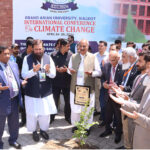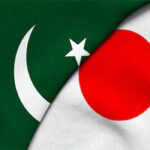By Syed Zahid Majeed
ISLAMABAD, Feb 13 (APP): Pakistan Bait-ul-Mal (PBM) is playing a dynamic role to empower and facilitate ignored segments of the society through its pro-poor initiatives by turning the country into a welfare state on pattern of Riyasat- i-Madina.
The PBM has devised an inclusive plan to reach out maximum deserving people even in the remotest areas of the country.
The social safety net programs for ensuring early education, child support and Medicaid bring about positive transformation in lives of thousands of people across the country.
The organization is significantly contributing towards poverty alleviation through its various pro-poor services and assistance to destitute, widows, orphans, and other needy persons as per eligibility criteria approved the PBM board.
Bait-ul-Mal is working hard to empower women, build their resilience and lift them out of poverty. The main aim of various initiatives of the organization is to break the cycle of poverty and make poorest of the poor self-sustainable.
Through Individual Financial Assistance (IFA), the poor, widows, destitute women, orphans and disabled persons are supported through general assistance, education, medical treatment and rehabilitation. It is providing financial assistance to deserving patients for medical treatment up to one million rupees from public sector hospitals.
According to official figures, Bait-ul-Mal has provided medical assistance to some 101,317 needy persons during the last five years. Some 16,729 individuals having complex diseases were provided medical treatment during the last financial year.
Any individual can apply for general financial assistance once a year only. Any of the two services including medical treatment, general financial assistance, education stipend, and individual rehabilitation may be granted simultaneously within a period of one year to the same applicant. However, general financial assistance and rehabilitation cannot be combined.
Pakistan Baitul-Mal has also signed a number of Memorandum of Understandings (MoUs) with various universities to provide additional scholarships to deserving students of universities. It has provided 6,755 education scholarships to deserving students during the last financial year while a total of 22,152 scholarships were provided to students of public sector universities in last five years.
Likewise, women empowerment centers of the organization are working throughout the country including Azad Kashmir and Gilgit-Baltistan since 1995. The centers were providing free training to widows, orphans and poor girls in different skills like drafting, cutting, sewing, knitting and hand and machine embroidery.
The PBM has also planned to establish at least one Vocational Dastkari School in each district. The current strength of these schools is 154 including 64 in Punjab, 30 in Sindh, 32 in Khyber Pakhtunkwa, 18 in Balochistan, and 11 WECs were working in Islamabad Capital Territory, Azad Jammu and Kashmir and Gilgit-Baltistan. Low-income group of women/girls were being trained in two shifts of 60 trainees, bi-annually.
The Child Support Program (CSP) of the organization is meant to increase admission and attendance of children in school and to decrease dropout ratio. It has also launched first ever conditional cash transfer program (CCT) namely the Child Support Program in 2007 for the poor families, especially those living in the poverty – ridden belts.
The intervention is designed with technical collaboration of the World Bank, aimed to provide a continuum of community based services for children and families. The PBM mobilizes funds from the government and distributes them as a cash subsidy to eligible beneficiaries for sending their children to school to get primary education.
Pakistan Bait-ul-Mal School for Rehabilitation of Child Labour have been established countrywide since 1995 to save the child labours aged 5-14 years from hazardous labour and enrolled in these centers where they are provided free education, clothing, footwear and stipend as well as subsistence allowance to their parents.
The Bait-ul-Mal is also providing financial assistance amounting to Rs.10,000/- to a family having one special person and Rs. 25,000 per-annum to a family having two or more special persons. It also provides wheel chairs, hearing Aid, white canes and artificial Limbs if needed.
According to a report approximately 100,000 patients were suffering from Thalassaemia in Pakistan and every year 5,000 babies were born with that deadly disease. Those patients needed regular blood transfusion and iron chelation after consultation with a qualified Hematologist along with regular diagnostic investigations on monthly basis which was unaffordable by the poor families in Pakistan.
The concept of ‘Panahgah’ emerges from Prime Minister’s vision of compassion to facilitate the destitute and helpless people,while upholding their self-respect. ‘Panahgahs’ protect the people from extreme weather conditions and chilling temperatures. Panahgahs not only provide shelter to daily wage earners but also a two-time meal to them.
The scope of ‘Ehsaas Panahgah’ and ‘truck kitchens Ehsaas Koi Bhooka Na Soye’ (EKBNS) program to serve free cooked meal boxes to poor was being further expanded. In each Panahgah almost 400 to 500 people were being assisted with a peaceful atmosphere as well as quality food and other emergency medical facilities.
The PBM has entered into a partnership with more than seven private hospitals for providing cochlear implants to deaf and mute children of poorest of the poor segment of society. A cochlear implant, costs over Rs 1.5 million. According to the agreement with private hospitals, PBM pays Rs1 million for each cochlear implant surgery while rest Rs500,000 plus was being paid by the respective hospitals.
Bait-ul-Mal has enrolled over 5,500 orphan children in its Dar-ul-Ehsaas Centres providing them free accommodation and basic amenities of life to marginalized section of society. The resident children were being provided furnished accommodation, free nutritious, balanced diet, free education up to Matric and above, free uniform, books, stationary, free summer/winter clothing along with shoes, medical care through government hospitals, skill development, and free laundry service.







